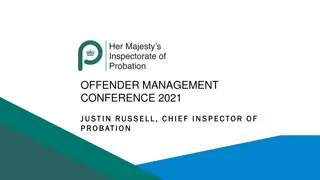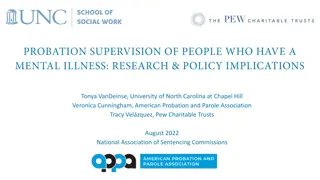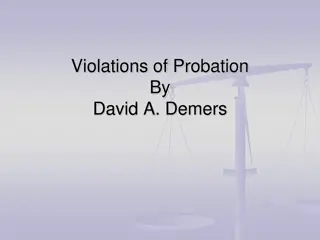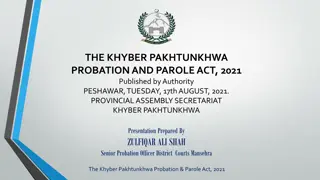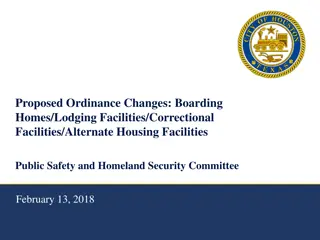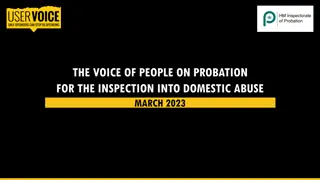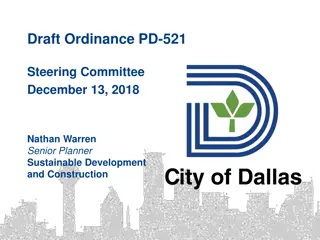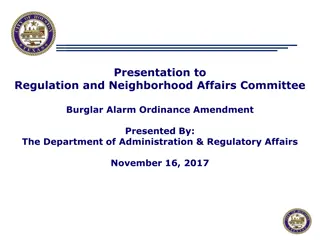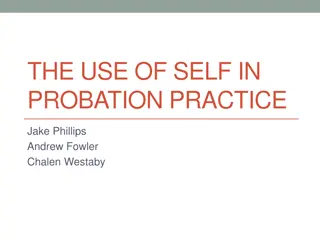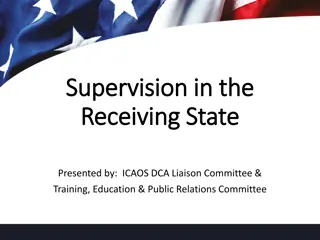Probation of Offenders Ordinance 1960: Salient Features
The Probation of Offenders Ordinance of 1960 in Pakistan allows courts to grant probation to eligible offenders, considering factors like age, character, and nature of the offence. Offenders under probation must adhere to specific conditions and can be supervised by a Probation Officer. Failure to comply may result in arrest or sentencing for the original offence. Probation does not amount to a conviction and does not affect the offender's rights.
Download Presentation

Please find below an Image/Link to download the presentation.
The content on the website is provided AS IS for your information and personal use only. It may not be sold, licensed, or shared on other websites without obtaining consent from the author.If you encounter any issues during the download, it is possible that the publisher has removed the file from their server.
You are allowed to download the files provided on this website for personal or commercial use, subject to the condition that they are used lawfully. All files are the property of their respective owners.
The content on the website is provided AS IS for your information and personal use only. It may not be sold, licensed, or shared on other websites without obtaining consent from the author.
E N D
Presentation Transcript
Probation of Offenders Ordinance, 1960 Salient features
Although the probation system was developed long before in almost all advanced countries, Pakistan did not have it until the promulgation of the Probation of Offenders Ordinance of 1960. The power of the Ordinance may be exercised by courts; from the High Court down to the Court of the First Class Magistrate, or any other specially empowered court, whether the case comes before it for original hearing or on appeal or for revision.
Eligibility for Probation under the Ordinance If a person who has not been previously convicted or commits an offence punishable with imprisonment for not more than two years, after considering the age, character, antecedents, physical or mental condition of the offender and nature of the offence and circumstances under which it was committed. The court may release him after due admonition or subject him to enter into a bond with or without sureties for not committing any offence and for displaying good behavior at least for a year which would be known as conditional release.
When a person is convicted of an offence not falling under Chapter VI or Chapter VII of the Pakistan Penal Code or under Sections 216 A, 328, 382, 386, 387, 388, 392, 393, 397, 398, 399, 401, 402, 455 or 458 of that Code, or an offence punishable with death/life sentence, if the court thinks fit, it may, instead of sentencing, make a probation order requiring the offender to be under the supervision of a Probation Officer for a period of not less than one year but not more than three years. Two more conditions are to be filled for a probation order 1. The offender must enter into a bond, with or without sureties, not to commit any offence, to keep the peace and be of good behavior during the period of the bond and to appear and receive sentence in case of violation of the terms of the bond. 2. The offender or one of his sureties must have a fixed place of abode or a regular occupation within the jurisdiction of the court which he would not leave during the period of the probation.
The court will determine terms of the bond and also the conditions of residence, environment and association for the offender for preventing the commission of offences. The court may also order the offender to pay compensations or damages for loss or injury if caused to any person by him. If the offender on probation fails to observe the conditions of his bond, the court may order for his arrest or may issue summons to him or to his sureties, and, if after hearing the court is not satisfied, it may sentence him for the original offence. The order of release after admonition, or conditional release or probation is not treated as a conviction. It does not, therefore, affect any right of the offender.
Working of Probation under the Ordinance When a person is convicted of an offence, the court after considering the circumstances and nature of the offences, instead of pronouncing a sentence, may ask the Probation Officer attached to the court for a pre- sentence report. This report includes a study of the offender s socio-economic background, the social environment in which he lived and the circumstances which led him to the commission of the offence. The court, after considering the suggestions and recommendations of the Probation Officer contained in the report, may release the offender on probation. The probation includes the conditions set by the court for his rehabilitation under the supervision of the Probation Officer.
The court may, at any time, ask for a progress report on the probationer and his relationship with the Probation Officer. The court in this way supervises the efficacy of the conditions imposed. The Commissioner or the Deputy Commissioner of the area may, at any time, request the Probation Officer for information about probationers under his jurisdiction. If the Probation Officer feels that the conditions of probation have been violated, he is to report immediately to his superior or to the court to which he is attached.
Duties of a Probation Officer under the Ordinance The Probation officer shall: 1. Explain to every probationer placed under his charge, the terms and conditions of the probation order and the importance of their observance; 2. During first two months, meet every probationer at least once a fortnight and therefore, keep in close touch with him to be aware of his conduct, mode of life and environment; 3. Endeavour to find suitable employment for him and assist, advice and strive to improve his conduct and general conditions of living; 4. Encourage the probationer to make use of the services offered by the recognized agencies; 5. Report the progress of the probationer to his superior or to the court; 6. Maintain the needed books and registers; and 7. Do any other duties or comply with instructions of the court.


